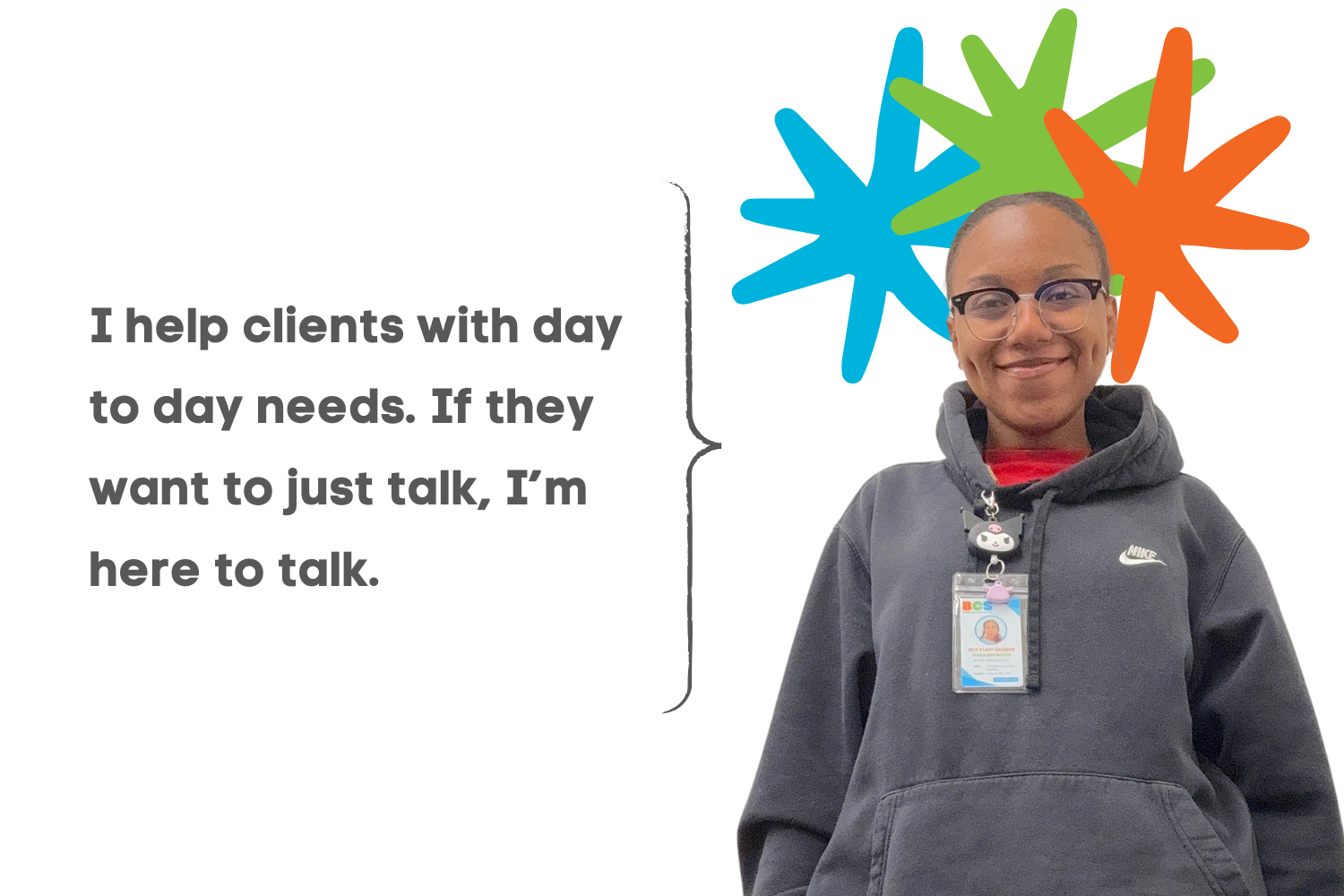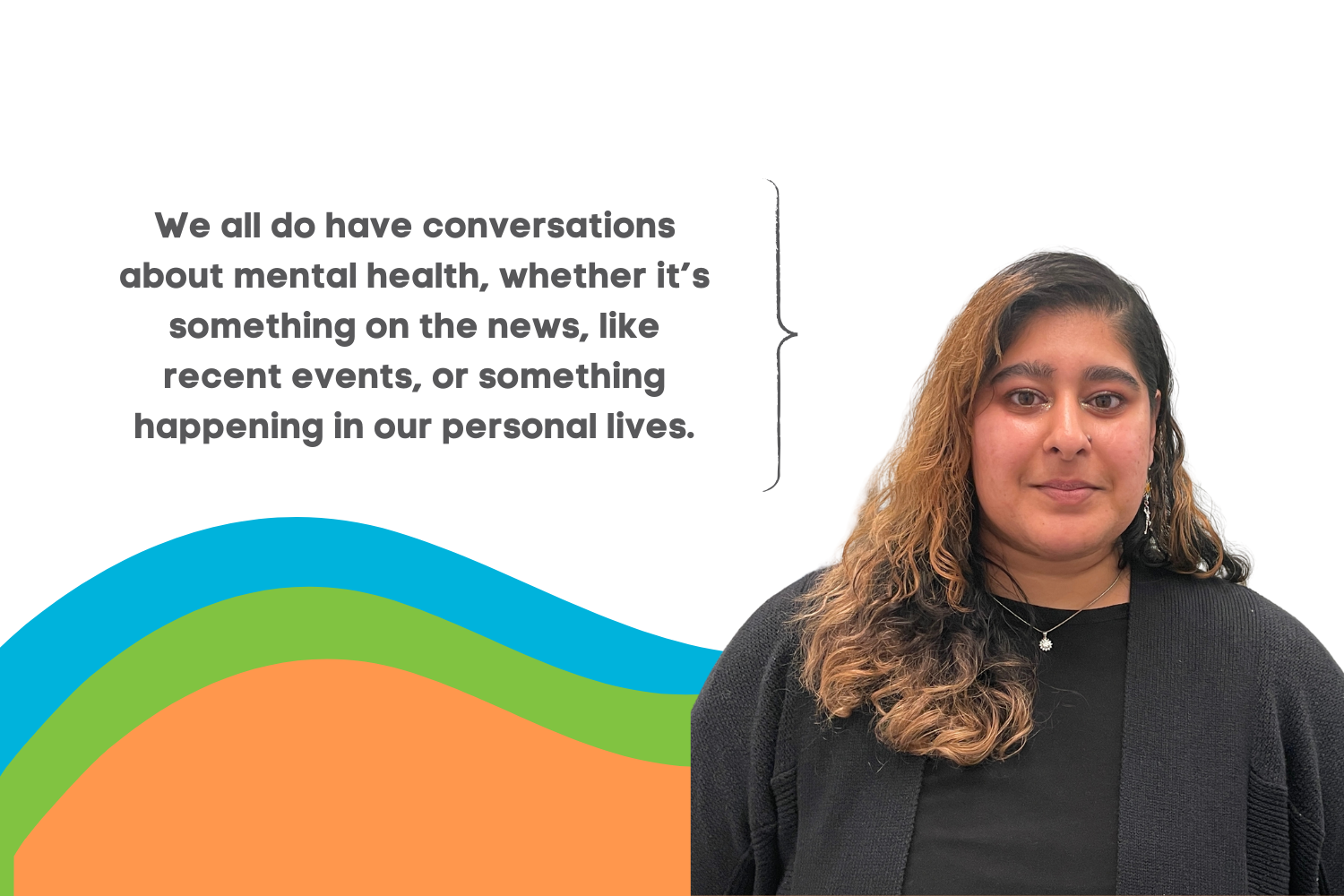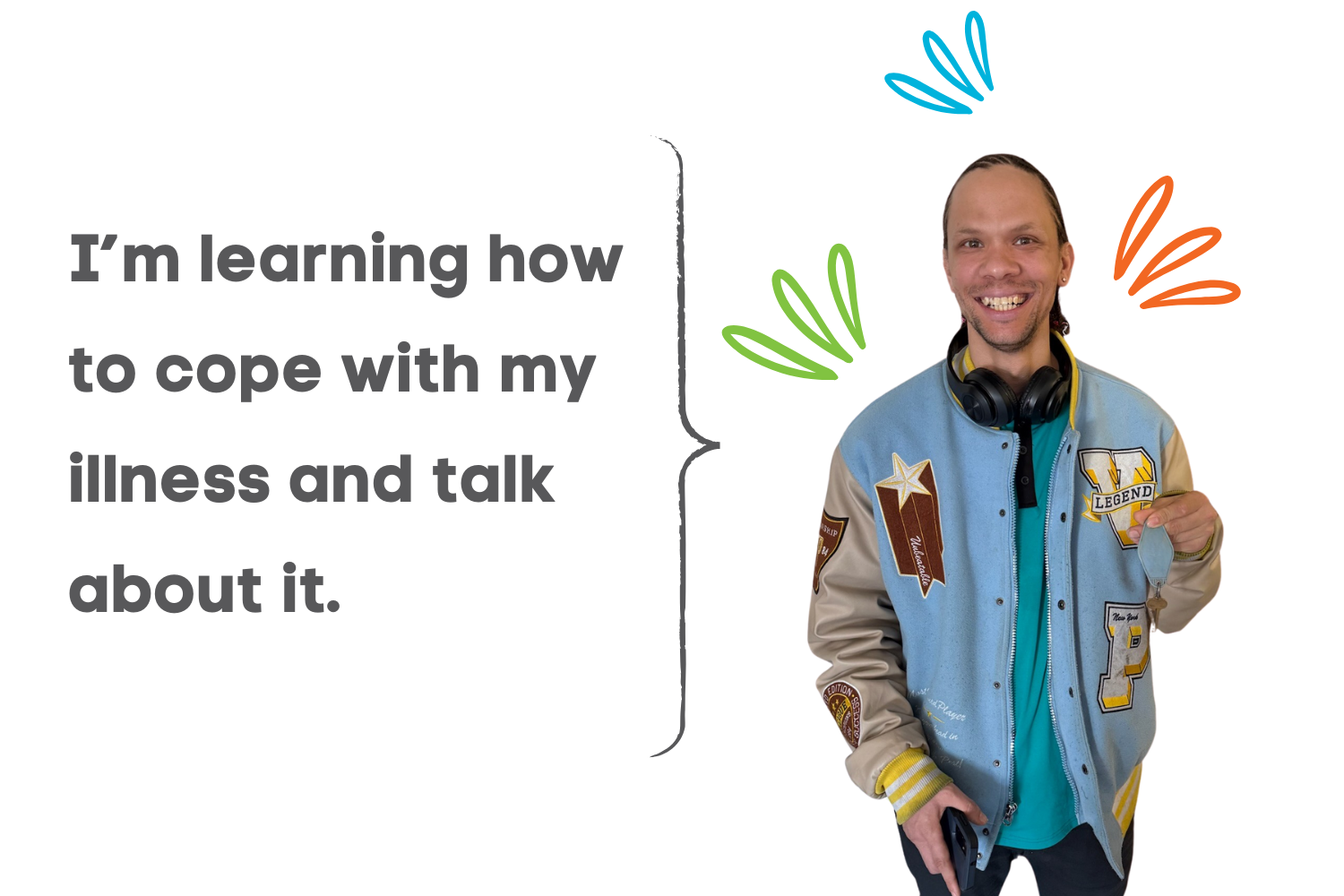Staff Spotlight: Tiara Brewster, Cortelyou

Could you tell me more about your position?
I’m a peer specialist. Now, every time I introduce myself as one, I like to tell people, “I’m like your professional friend.” I help clients with kind of day to day needs—anything they really need me for. If they want to just talk, I’m here to talk. If they want help figuring out, “Hey, how do I access this thing on Microsoft 360?” I’m here for that too. I do a little bit of everything, so I wear many hats. I can help with the important stuff or the fun stuff. Like, “Why did my friend do this to me last week? Should I say this or that to them?” I’m here. But getting to HRA [Human Resources Administration]—I can help you get to HRA too.
How did you get this job?
My brother’s girlfriend works for BCS as well, and she’s an employment specialist. She told my brother a bit about what it’s like working at BCS, and he thought that maybe I might suit some sort of role working in a nonprofit. I was like, “Alright, okay, cool.” My brother did a little digging for me, and he was like, “I saw this role for a peer specialist. You have previous experience with mental health, so it seems like it’d be something you’d be into. It seems like you’d be able to help people well with this.” I did research and thought I aligned well with BCS, so I went for it. It’s my first job.
Wow! That’s great. What’s your educational background like?
Prior to this, I was in college. I’m still in college, but I was in college for an Associate Degree in Health Sciences, and I finished that during my time here. I re-enrolled in college for my Bachelor’s in Psychology. At the same time of obtaining this position, I was already kind of in the midst of like, “Hey, I think I want to get into psychology, social work, mental health, something of that nature.” I had volunteered at my mom’s old job where she worked with the elderly, and I worked with people who had Alzheimer’s and dementia. And there’s the social work aspect of it, having previously dealt with that sort of population, where I felt like I could get into this. Also, I felt like I could work with the younger population well because I’m also young.
What’s the general kind of age range of the clients you work with at Cortelyou?
The age range is supposed to be between 18 and 25, so I would say most are in their early 20s. I feel like, given our similar age, we can really connect with the Gen Z lingo, TikTok…It’s easier for them to connect with me, and it’s easy for me to build a rapport with them. Being able to see how they came from what they came from to where they are now, and what they do after this is really nice. It inspires me to keep moving forward.
Did many of them have similar paths in terms of how they got to Cortelyou?
Yeah, most of our clients have either been previously homeless or they aged out of the foster system. Mentally, they have a lot of similar things like anxiety, depression…They deal with mental health struggles and housing instability, and we’re just trying to help them live on their own and tell “you’ve got this.”
How long are most people in supportive housing? Does it vary a lot?
It really varies. People can be here for a couple of months, and then they’re out, they have their own place, they’re living by themselves, they’re working, they’re going to school. But then others take much longer, which is okay. I’d say that, at the very least, everyone is pursuing something, so they’re trying to work, trying to go to school.
Is part of your job helping them figure out what they want to pursue?
Yeah, I’ll definitely be helping them figure out if they want to go to school and what school they want to go to. Then I’m helping them with the process of financial aid. Or, if they want to work, I would refer them to our employment specialist, but they can still come to me if they want.
Does Cortelyou work with partner organizations or certain job training programs?
Yes, usually the employment specialist posts or emails something for the clients telling them that we have free OSHA training, for example. That training is called Man Up. And I’ll spread the word and say something like, “Hey, you wanted to get a job, right? There’s this thing you can join.”
Are there any client success stories that you can speak to or just clients who you feel were really able to turn things around during their stay?
Well, I’ve had a short tenure here. I’ve been here six months, so I’m super new. I’m a baby. But there’s one client, Ash. From when I first met him to now, he’s had some extreme growth. He previously dealt with addiction. In my short time here, he has already become a peer specialist.
He’s still doing his freelance work as a photographer every now and then, and he’s hoping to start school again to get his Bachelor’s in Psychology. I personally think he would do really well with that. Honestly, he’s probably a better peer specialist than me. He’s coming from a place of depression and addiction, but when he feels like backpedaling, he always comes to us. He openly talks about his addiction with us and with other clients, if need be.
Do you think that it’s helpful for others to hear one of their peers talk about it so freely?
Yeah, we have another client who struggles with addiction, Felix, and Ash really sits down and takes time to talk to him. He tells him that it’s a struggle, and if you want to get better, you’ll really need to want to get better. He tells others not to push. He’s big on harm reduction, and the fact that he can talk about it without backpedaling is really impressive.
What are the difficulties of your job?
It would definitely be dealing with clients who don’t want help, but want help. Like, they don’t want to admit that they want help, so nothing happens. They get upset at us, and you want to explain to them, “Hey, it can be done, but the point is for you to learn how to do things on your own.” But you don’t want to say it like that because then you tend to get backlash from them.
What are your favorite parts of the job?
I think seeing them happy, even if it’s small things. “Hey, I went to the store by myself today,” or “I applied for a job today all on my own.” It’s really about celebrating even the little wins.
What’s the staff structure of Cortelyou like?
There’s the program director, assistant program director, employment specialist, three case managers, and me. We used to be super short staffed, and I will say that our being short staffed really showed. I felt like I was doubling the role of being a peer specialist and a case manager, entitlement specialist, etc., but the clients were fine. They were just wondering, “Hey, when am I gonna get my new case?” Now that we have more people, I can finally take a breath. I’ve been helping introduce the new staff to the clients to get them acquainted. We’ve got everybody set now.
Top Viewed Posts
Youth Art Programs
Program Spotlight: Day Habilitation
BCS Volunteers Spring into Action for Brooklyn
Recent News

Staff Spotlight: Tiara Brewster, Cortelyou
April 8, 2025
Read More
Program Participant Spotlight: Ummaromana Sama, CHAMP
March 31, 2025
Read More
 SUBSCRIBE
SUBSCRIBE 










